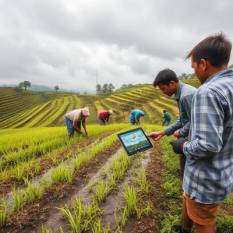MANILA / Philippines, 24 June 2025: In a landmark effort to reshape the future of rice farming in Asia and the Pacific, the Asian Development Bank (ADB), in collaboration with CGIAR and with strategic support from the Bill & Melinda Gates Foundation, has unveiled a $1.5 billion initiative to accelerate the transition to sustainable, low-carbon rice production.
Announced on June 10, 2025, the initiative directly targets the millions of smallholder farmers across the region who depend on rice cultivation for both food and income. As the pressures of climate change, water scarcity, and declining crop yields mount, this program aims to provide both relief and a roadmap to a resilient agricultural future.
Rice is the dietary cornerstone for over half of the Asia-Pacific population. Yet the sector faces increasing threats, including dwindling water resources and a growing role in greenhouse gas emissions. Rice farming contributes up to 10% of global methane emissions—a critical concern in climate discussions.
“Rice is not just food—it is livelihood for hundreds of millions,” said ADB Vice-President Fatima Yasmin. “But the traditional ways of growing it are no longer sustainable under the current environmental conditions.”
To steer the transition, the ADB–CGIAR Clearinghouse Facility will be the central driver of innovation and policy. Supported by cofinancing from the Gates Foundation, it will focus on scaling up climate-smart technologies that:
- Boost rice productivity
- Improve water-use efficiency
- Lower greenhouse gas emissions
- Enhance resilience to climate shocks
ADB has committed up to USD 1.5 billion between 2025 and 2030 to fund the rollout of cutting-edge farming techniques. This forms part of ADB’s broader $40 billion Food Systems Transformation Strategy, announced in May, which aims to overhaul agriculture, nutrition, and rural livelihoods throughout the region.
According to Yvonne Pinto, Director General of the International Rice Research Institute (IRRI) and a key CGIAR partner, this marks “a new chapter” in rice system innovation. “We’re not just scaling science—we’re scaling solutions that are tested, trusted, and transformative.”
The first phase of the initiative will launch in Bangladesh, Cambodia, China, Pakistan, and the Philippines—regions where the rice sector is both vulnerable and vital. Through multi-stakeholder partnerships and continuous funding, the program aims to uplift marginalized farmers while reducing the environmental footprint of one of the world’s most important crops.
The initiative is not just about technology—it’s about inclusive development, said project leaders. It will work alongside national governments, agritech firms, NGOs, and farmer cooperatives to ensure that innovation reaches the grassroots.
As global agriculture stands at a crossroads, the ADB–CGIAR–Gates Foundation partnership offers a timely and transformative approach to ensure that rice remains a source of food, income, and climate resilience for generations to come.




















